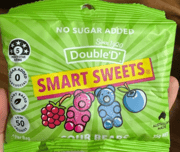Top 11 Weight Loss Myths DEBUNKED
- Replies 3
There are thousands and thousands of tips and tricks about weight loss floating around on the internet. With the number of online fitness influencers increasing by the minute, it’s getting harder for individuals like us, who just want to shed some weight, to separate facts from fiction.
Thankfully, one health coach is here with us today to help us rise above the misinformation.
Graeme Tomlinson, a UK-based nutritionist and the mind behind the Instagram account @thefitnesschef_, has explained that dieters often believe the “loudest” advice, rather than the best.
He highlighted the importance of going slow and steady, rather than abrupt changes in a short period of time. He added that people who are trying to lose weight often feel discouraged when they don’t see the results promised to them by the internet, leading them to fail before they even start.
So, to help people avoid suffering at the hands of diet myths, Mr Tomlinson is here to set records straight.
Credit: Shutterstock/KarepaStock.
Myth # 1: Scales don’t lie.
Actually, they do.
Over the years, weighing scales have always been used to keep track of people’s weight loss (or weight gain) progress. But according to Mr Tomlinson, they are not always reliable in determining whether you’re losing excess fat or not.
Yes, a weighing scale measures our weight, as its name suggests, but it measures much more than our body fat. It also measures our muscles, our carb and salt consumption, our food and water intake for that day, even our clothes! That’s why basing our progress on the numbers of the scale are, more often than not, unhelpful for us.
Instead, Mr Tomlinson suggests taking progress photos instead. According to him, they are much more accurate measuring tools in the short term and would not place your self-esteem hinging on digits on a scale.
Myth # 2: Avoid eating carbs to lost fat.
To quote Regine George’s iconic line from the film Mean Girls, “Is butter a carb?” Yes! But don’t worry, you can still enjoy your buttered snacks.
In fact, no scientific evidence supports the claim that avoiding carbohydrates makes you lose weight. So be wary of people pushing their low-carb agenda, because they might just be bluffing.
Instead of banning carbs, Mr Tomlinson recommends focusing more on watching your calorie intake. “You can eat any mix of protein, carbs and fat, as long as your total calorie intake is less than your calorie burn,” he said, adding that 1 gram of protein per kilogram of our body weight is beneficial for weight loss.
Myth # 3: Eating fatty foods makes you fat.
Similar to the food myth above, consuming fat does not inherently make us fat.
According to Mr Tomlinson, fat is the most calorie-dense macronutrient, having 9 calories per gram. But just like carbs, once we focus on carefully watching our calorie intake, we can enjoy our fatty food and lose weight at the same time.
Myth # 4: A gym membership is required to lose weight.
This one’s a big NO from Mr Tomlinson’s book.
It’s actually surprising that many people were convinced they have to avail expensive memberships if they want to shed body fat, but this should not be always the case.
Instead, the health coach recommends opting for an activity you enjoy. It can be walking your dog, a brisk jog in the morning, regular stretches, dancing, and many more!
He said: “The key is finding an activity you enjoy enough to keep doing it regularly – start by doing it for just 15 minutes a day and build up.”
You can even ask friends to join you and help each other sustain your goals together!
Credit: Getty Images/iStockphoto.
Myth # 5: Eating after 6 pm makes you fat.
We have to admit, we’re kinda guilty of falling for this one.
Mr Tomlinsons said: “Your metabolism doesn't stop, or change based on the time of day,” meaning, we can absolutely eat at night without gaining unwanted fat.
Again, the key is watching our daily total calorie intake.
If you are finding it hard to give up your evening snacks completely, opt for a low-calorie option!
Myth # 6: Butter in coffee is good for fat loss.
“Of all the misinformation doing the rounds, this one is perhaps the most ridiculous,” said Mr Tomlinson.
In truth, adding butter (which is a calorie-rich carb) to a drink consumed within mere minutes might be a little unhelpful.
For one, a lot of calories are consumed but it does not make you feel full for longer, pushing you to eat more food throughout the day. Second, butter adding “energy” to coffee intake is pseudoscience and is a mere conjecture.
Instead, you can consider low-calorie options in upgrading your cuppa, such as opting for skim milk.
Myth # 7: Vegetable oil is bad for your health.
There has been a recent health fad claiming that vegetable oils are “toxic and poisonous”, so people should go for coconut oil and butter instead.
According to Mr Tomlinson, this couldn’t be further from the truth.
“Too much saturated fat, which things like butter and coconut oil are high in, can raise LDL cholesterol, resulting in an increased risk of cardiovascular disease,” so he advises using vegetable oil or olive oil instead.
Myth # 8: Going vegan is better for your health.
And while it’s true that a vegan diet has its own health benefits, Mr Tomlinsons says that it’s all about context.
“If you previously had a diet high in processed, low-quality animal produce then switching to a plant-based diet would likely improve your health.
“But if you currently have a diet rich in fresh, high-quality animal produce high in vitamins and minerals and also include lots of plants, going vegan will simply eliminate important nutrients from your diet,” he added.
Myth # 9: Consuming 800 calories a day is great for weight loss.
This one has been going around more frequently on social media. According to the myth, limiting yourself to only 800 calories per day will make you shed fat.
But it’s not true. You can eat a lot more than 800 calories a day and still lose weight.
Again, the key factor is creating a calorie deficit.
We are all different sizes and have different calorie needs so it’s still best to consult with your doctors to know what’s best for you.
Mr Tomlinson said that following 800 calories a day is either unsustainable or “an eating disorder waiting to happen”.
Credit: Shutterstock/Ekaterina Markelova.
Myth # 10: There are “good” and “bad” foods.
And while it’s true that not all foods are good for our overall health, dividing your foods into “good” and “bad” is actually more harmful than helpful.
“No food individually makes you fat or unhealthy, just like no food makes you lean or healthy,” said the health coach.
He added that there’s no need to beat yourself up and avoid your favourite foods just because they’re classified as “bad” foods.
“The key to good physical and mental health is to have a balance of nutritious foods and those less nutritious foods you love too.”
Again, the key is watching the number of calories and nutrients you eat over time, and you’re all good.
Myth # 11: Your weight defines your worth.
This one has been going around longer than any of the previous myths mentioned.
Like Mr Tomlinson, we have to agree that the numbers on the scale determining your weight would never be able to define you as a person.
Aside from being physically healthy, it’s important as well that we keep our mental and emotional health in check, too, and remember that happiness won’t always come from being a few clothes sizes smaller.







